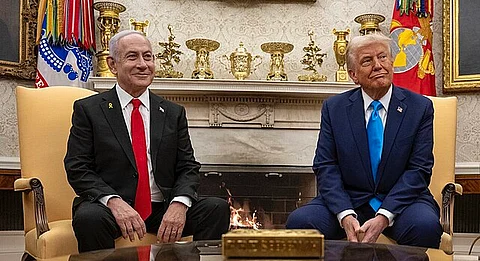

Israeli Prime Minister Benjamin Netanyahu and U.S. President Donald Trump have reached a tentative agreement to end the Gaza war within two weeks, according to a report by Israel Hayom citing sources familiar with their recent phone call. The deal, negotiated with Secretary of State Marco Rubio and Israeli Strategic Affairs Minister Ron Dermer, includes five key elements: an immediate ceasefire, release of remaining hostages, exile of Hamas leadership, Arab-led administration of Gaza, and a dramatic expansion of the Abraham Accords to include Saudi Arabia and Syria. Netanyahu later stated the Iran conflict’s outcome created a "window of opportunity" for regional peace that "must not be missed".
Under the proposed framework, Egypt and the UAE—joined by two unspecified Arab nations—would assume governance of Gaza, replacing Hamas. The plan includes voluntary emigration for Gazans wishing to leave, though destination countries remain unconfirmed. Hamas leaders would be exiled, while approximately 50 remaining hostages (fewer than half believed alive) would be released. This transition aims to address Gaza’s humanitarian crisis, where malnutrition affects 95% of households and over 90% of the population remains displaced.
In exchange, the U.S. would recognize limited Israeli sovereignty in parts of the occupied West Bank, while Israel would publicly endorse a future two-state solution contingent on Palestinian Authority (PA) reforms. The Abraham Accords’ expansion to Saudi Arabia and Syria would mark a significant diplomatic shift, though Saudi officials previously demanded concrete progress toward Palestinian statehood as a precondition. Netanyahu’s coalition faces internal turmoil over this concession, with far-right ministers Bezalel Smotrich and Itamar Ben-Gvir adamantly opposing Palestinian statehood.
Despite ceasefire hopes, Israeli airstrikes killed at least 21 Palestinians in Gaza on Thursday: nine at a displaced-persons’ school in Gaza City, nine near a Khan Younis tent camp, and three aid-seekers shot by troops. These deaths highlight the stark contrast between high-level diplomacy and conditions on the ground, where over 860 Gazans have died since the Iran-Israel conflict began June 13. The Palestinian Authority, excluded from negotiations, condemned the sovereignty proposal as "anathema to self-determination".
The plan’s feasibility remains uncertain:
Hamas rejects exile, vowing to "remain rooted in our land".
Syria’s inclusion in the Abraham Accords appears implausible amid ongoing instability and Iranian influence.
Saudi Arabia insists on irreversible steps toward Palestinian statehood.
Netanyahu faces pressure from hostage families demanding "no more delays," while coalition hardliners push for reoccupying Gaza.
As Netanyahu leverages perceived victory against Iran to reshape regional alliances, Palestinians brace for continued violence. With famine persisting and airstrikes killing civilians daily, the disconnect between diplomatic promises and Gaza’s devastation grows ever starker.